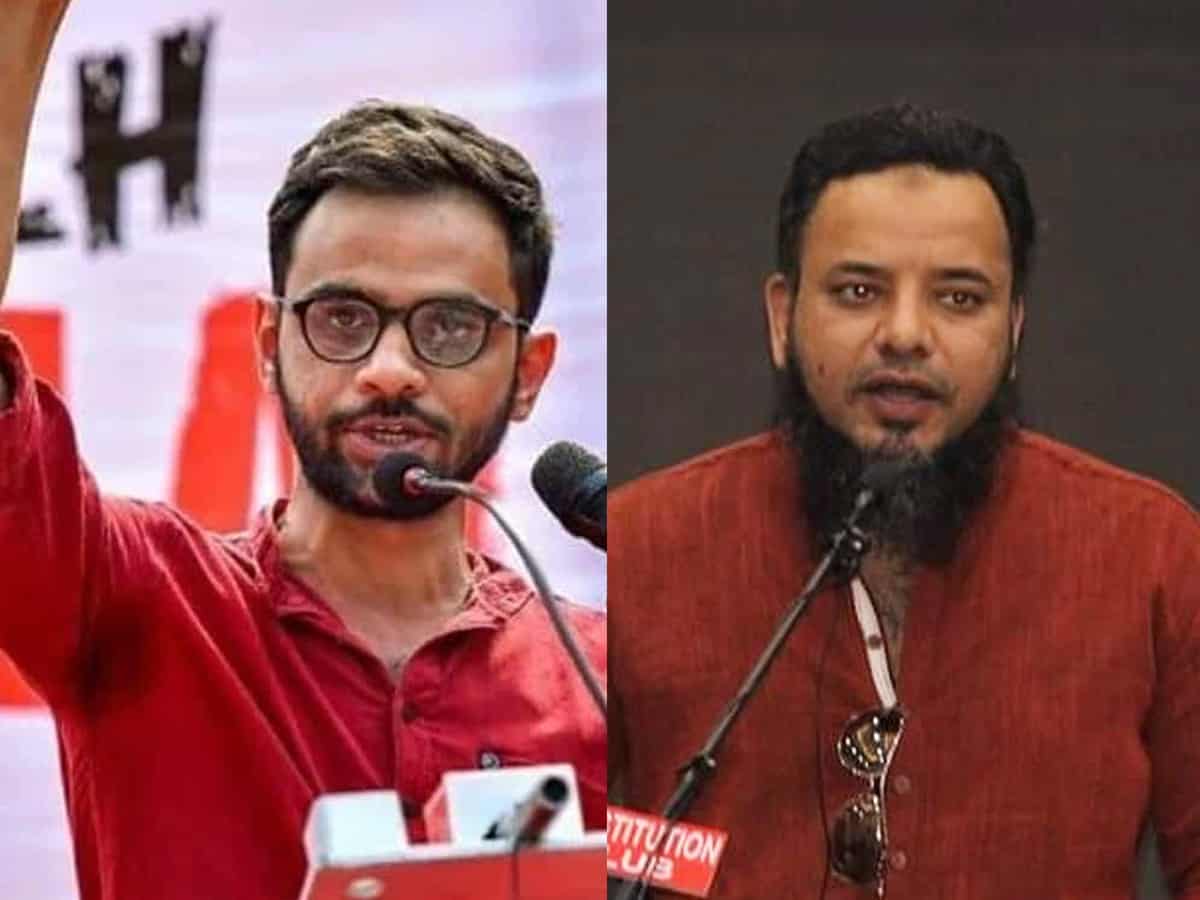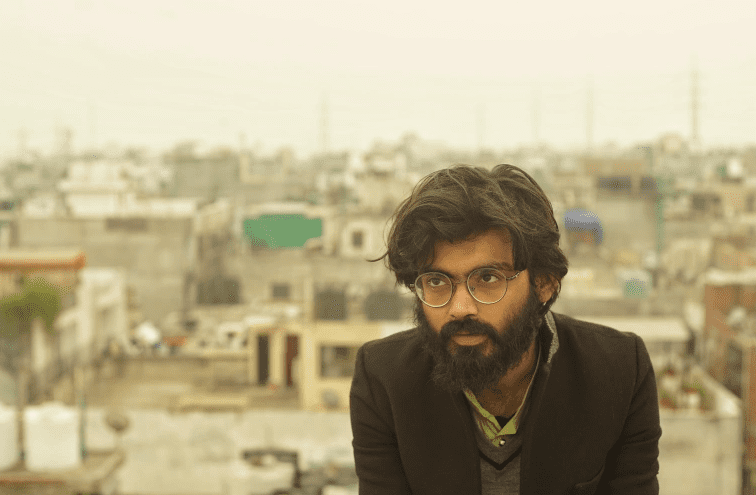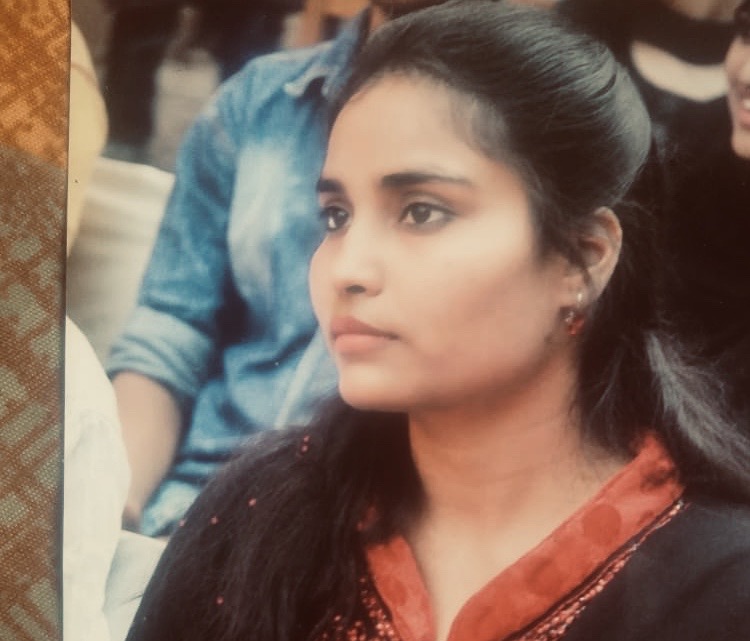Eid’s Quiet Mourning: Unseen Tears of Families of Delhi Riots Accused Held Under UAPA for Years

Devanshi Batra, TwoCircles.net
New Delhi: In a poignant lament, 60-year-old Sayyad Tasneef Hussain spoke softly, his voice laden with grief that has settled deep within his heart over time. “Chashm-o chiragh to hai kisi aur ke liye, apne naseeb mai hai andhere likhe hue (eye and lamp are for someone else, in my fate, darkness is inscribed),” he said, recalling the sher-o-shayari sessions he once shared with his beloved daughter — Gulfishan Fatima.
Hussain dearly misses those poetic exchanges, never envisioning that the verses he once recited to her would one day echo their own reality.
Booked under stringent Unlawful Activities (Prevention) Act or UAPA for allegedly conspiring 2020 Delhi riots, Gulfishan marked four years in prison on April 9 this year, following her arrest by the city police in 2020. She had participated in protests against the controversial Citizenship Amendment Act (CAA) and proposed National Register of Citizens (NRC) and National Population Register (NPR). Her bail plea currently awaits a decision from the Delhi High Court.
Athar’s maternal grandmother, in her 80s, who anxiously waits for his return after each court hearing, with her eyes fixed on the door. Athar Khan was one of the 18 individuals detained for protesting against the CAA in northeast Delhi. At the time of his arrest, he was the youngest among those booked.
On July 2, 2020, Khan was charged under the UAPA by the Delhi Police Special Cell, following a photograph posted by BJP leader Kapil Mishra (whose inflammatory speech allegedly led to the deadly violence in the Trans Yamuna region), accusing him of being one of the masterminds behind the riots. Now, he has to secure bail in one only case — the UAPA case (which is related to “larger conspiracy”). He has already secured bail in other matters.“Everything stands still. I await the right moment when he will return to us,” reflects Muzammil Imam, younger brother of Sharjeel Imam and a fellow activist who has also been languishing behind bars in the same “conspiracy” case.
Muzammil deeply misses his brother, his confidant, the one with whom he shared every aspect of life.

Sharjeel, an IIT graduate and a Ph.D. scholar at Jawaharlal Nehru University (JNU), was arrested in 2020 across several states, including Assam, Arunachal Pradesh, Manipur, Delhi and Uttar Pradesh, for his speeches during protests against the CAA and the proposed NRC. Initially charged with sedition, he later faced accusations under the UAPA.
He so far has spent four years in detention without being convicted in any of the cases. To walk out of jail, he has to secure bail only in the UAPA case.
For Khalid Saifi’s 10-year-old daughter Mariyam, those precious five minutes on the phone with her father are a lifeline. Her words rush out urgently, her small voice filled with the need to share every detail of her day. She was just six years old when her father was taken away, and these brief calls are her only connection to him.
Reflecting on her husband’s arrest, Nargis Saifi recalled, “When Khalid left home that day, he was fine. A day later, I saw him in a wheelchair. It has been 300 days since then.”
“When I first saw him in jail, he had injuries all over his body. His forehead was scratched with nails, and his hair and beard were pulled out. And this was only what we could see. I cannot even bear to talk about the internal injuries,” she added.
Khalid was arrested by the Delhi Police on February 26, 2020, and has been in custody since. Nargis, a 34-year-old homemaker and mother of three young children, now faces life without her partner. Khalid was charged in three cases in late February 2020, including under the UAPA.
Saleem Khan's daughter, Saima Khan, eagerly anticipates court hearings to catch a glimpse of and visit her father. Despite their initial hope, she admits it is slowly fading. "Initially, my dad used to write letters to the Chief Justice, the Home Minister, and the President. But now he has stopped writing those letters," Saima says, her voice tinged with sadness. The once-hopeful letters have ceased, reflecting his growing despair as the days drag on.
Saleem Khan was named as an accused in three FIRs filed by the Delhi Police, who described him as “one of the main organizers of the riots”. He was arrested on March 13, 2020.
While he was granted bail in two cases, he remained in prison due to the third FIR, which is registered under the UAPA. His bail for this case is currently pending in the High Court.
Recently, Saleem was granted parole for 14 days and returned to prison on June 21. Saima Khan cherishes these brief moments with her father, treasuring the small amount of time they got to spend together.
“In the beginning, he was hopeful, but now that hope has faded as the court proceedings drag on,” says Qasim Rasool Ilyas, father of Umar Khalid. “He is caught between hope and hopelessness, understanding that this process will take a long time.”
Umar was also described as the “mastermind” of the Delhi riots by the Delhi Police and booked in two cases. In one case, he was not only granted bail but was eventually discharged. However, in the UAPA case, judges have refused to grant bail to him and many of his co-accused. Despite four years having passed, the trial for this case has yet to commence.
The Long Shadow of UAPA: Impacting Entire Families
“The UAPA does not just target individuals but entire families,” lamented several political prisoners, some prominent and others less known, who remain detained for their participation in protests against the CAA.
These individuals, including student leaders and activists like Khalid Saifi, Umar Khalid, Sharjeel Imam, Gulfishan Fatima, Saleem Khan and Athar Khan, face charges under the stringent UAPA, alleging a “larger conspiracy” to stoke religious tensions.
Family members of those imprisoned since the 2020 unrest argue that the legal proceedings unnecessarily prolong despite their innocence. They contend that the process feels punitive, exacerbating the hardship of actual imprisonment.
Nargis’ voice breaks as she reflects on the ordeal: “UAPA does not just affect the individual, it tears apart families.”
Her husband Khalid, once a pillar of reason and compassion in their community, now finds himself labeled and locked away. “He misses taking walks with the kids, having pillow fights with them, and most of all, holding them in his arms,” she confides.
Meanwhile, Gulfishan’s resilience brings solace to her loved ones. “I will come out after the next hearing,” she reassures her family, her words a beacon of hope amidst the uncertainty of courtrooms.
Despite her strength, the void left by her absence weighs heavily on her brothers, who anxiously await her return, discussing her future marriage in hopeful whispers.
With tears in his eyes, her father lamented, “We feel powerless, while she remains strong for us, especially for her mother.”
Najmuddin, aged 45, is uncertain when his 28-year-old nephew will be released from prison. Athar’s arrest and prolonged imprisonment have been a distressing ordeal for the family. As the eldest of four siblings, he had been engaged in spice trading to support the family financially. Consequently, his youngest sibling has forsaken studies to take up the responsibility of managing the family business.
“When I sit with my sister, Athar’s mother, she rarely meets my gaze. Athar was the firstborn in both his maternal and paternal families. He used to spend most of his time at our home. Back then, digital cameras weren’t common, and I still cherish about 1000 reel photos of Athar,” Najmuddin reminisced.
Separated from their loved ones by prison walls and legal battles, these families endure a profound longing that goes beyond mere physical absence. Each day becomes an agonizing wait, marked by fleeting moments of hope during court hearings and solemn celebrations where empty seats serve as painful reminders.
For Nargis, the yearning manifests in quiet moments on the balcony, where she peers down the familiar lane, hoping against hope for his husband’s return. “I used to stand on the balcony for hours, gazing down the lane, hoping for Khalid to appear,” she said in a choked voice.
Muzammil portrays a picture of resilience amidst adversity. “He consoles me and my mother. He just needs food and books, and he is sorted,” he affirms, reflecting on Sharjeel’s calm demeanor despite the daunting legal battles ahead. “He knows it is a time-consuming process, and he remains steadfastly patient.”
Their struggle extends beyond the confines of legal proceedings, as Muzammil explains, “We are battling against the government, the judicial system, societal perceptions and even fellow inmates who label him radical.” He emphasizes that the fight spans both the physical confines of prison and the broader societal landscape.
Sharjeel’s case, spanning across five different states, adds another layer of complexity. Muzammil reflects on the challenges faced: navigating unfamiliar local languages, managing travel logistics and bearing the financial burden. “It was all new to me and very difficult,” he admits, highlighting the overwhelming nature of their journey.
Across these households, the absence of their loved ones reverberates in disrupted everyday routines and deferred dreams. Each missed milestone and unanswered question deepens their resolve, fueling their determination to see justice prevail and their beloved return. In the quiet corners of their homes, they cling to the belief that one day, the doors will swing open and their cherished ones will step back into the embrace of their waiting arms.
Saima Khan, who has put her medical studies on hold to support her family during her father Saleem’s absence, embodies the silent sacrifices made in the face of uncertainty.
“They keep changing court benches, transferring proceedings and prolonging the case. We are left in the dark about why bail is stalled. If they intend to deny it, they should do so decisively instead of keeping us in suspense. These jailed individuals have been forgotten by everyone. Initially, there was attention on their plight, but now there is a lack of thorough investigation,” she remarked.
She recounted a recent incident: “My father faced disrespectful treatment. When he was stepping out of jail, he was instructed to remove his skullcap or risk being denied exit. Many inmates label him as a terrorist.”
In the solitude of his confinement, Umar remains a distant figure to his father, Syed Qasim Rasool Ilyas, confined to a solitary room. “His five younger sisters miss him a lot,” shares Ilyas, his frustration palpable. He dismisses the charges as baseless. “This case is completely fabricated. There is no evidence to support it, which is why they are dragging it out,” he asserts.
Eid Without Them: Empty Chairs, Steadfast Hearts
Last week, Eid was celebrated joyously by many, marked by prayers, sacrifices, feasts and gatherings with loved ones. However, for some families, the festivities were overshadowed by a profound sense of loss and longing. For them, Eid did not bring the usual warmth and joy; instead, it served as a stark reminder of the absence of loved ones and the anguish of unjust circumstances. Amidst the celebrations, these families grappled with sadness and yearning for normalcy that has been elusive for far too long.

For Gulfishan’s family, the festival brought no joy, only profound sorrow. “Eid is like Muharram for us. While everyone else celebrates, it is a moment of sadness for us,” her father lamented. “Her mother cries day and night, and so do I. What else can we do?” he said, his words resonating with the inconsolable pain of a family torn apart by unjust circumstances.
As the festival passed, Athar’s family shared similar sentiments of loss amidst what should have been a time of togetherness and celebration. “It is not a celebration anymore, just a formality,” remarked his maternal uncle Najmuddin, his tone tinged with longing.
“Every Eid, his maternal grandmother used to call him for the feast. When Athar would rest in her lap, she would shoo away anyone who tried to disturb him,” he recalled fondly, the memory of happier times contrasting sharply with the present reality. Athar’s father, once proud to stitch badges for police uniforms, now faces a different kind of encounter with law enforcement — one fraught with uncertainty and injustice.
Reflecting sadly on the recent Eid, Nargis shared a poignant moment. “When Khalid asked this Eid what she cooked, she lied and said dal (pulses). Khalid asked, ‘Why? Have a good meal’,” she recounted, a brief moment of humor amidst their heavy situation.
“On our children’s birthdays, he buys things and distributes them inside the jail,” she continued, highlighting his enduring love even in confinement.
“It has been four years. How many Eids will pass like this? My children are growing up without their dad. What is their fault?” Nargis questioned, her voice filled with the anguish of a family torn apart by “injustice”.
As a mother grappling with the void left by her husband’s absence, she lamented, “During the years when they needed him the most in their teenage years, he could not be there. I had to google things to tell my son. Who will bring back this time?”
“On Eid, Khalid used to take the children for prayers. All the fathers take their children, while mine just watch. My son was 11 years old; now he is 15. Har cheez mein unki kami hai (His absence is felt in everything),” she sighed.
“Khalid is very attached to children. My daughter could not sleep for days without him. He always wished for a daughter,” she added.
When Khalid asked Nargis if she had finished applying her makeup, she replied, “It has not finished, but dried up.”
For Sharjeel’s brother, this unsettling reality now feels like the new normal.
“This is our new normal. We used to celebrate Eid together, now we plan for the next, but it never happens,” he said.
“Sharjeel has spent the past four years leading Eid prayers for everyone inside the jail. He is a big food lover. I miss having meals with him on Eid,” Muzammil sighed.
Saima reflected on their recent Eid, a rare moment of celebration amidst years of hardship.
“We did not celebrate Eid for the past three years. This time, we finally did, and it felt like old times,” she recalled, momentarily escaping the shadow of adversity.
